'It was a disaster' – How Enric Mas lost all confidence, then got it back
Spaniard opens up about descending yips, psychology sessions, and inching closer to the world's best
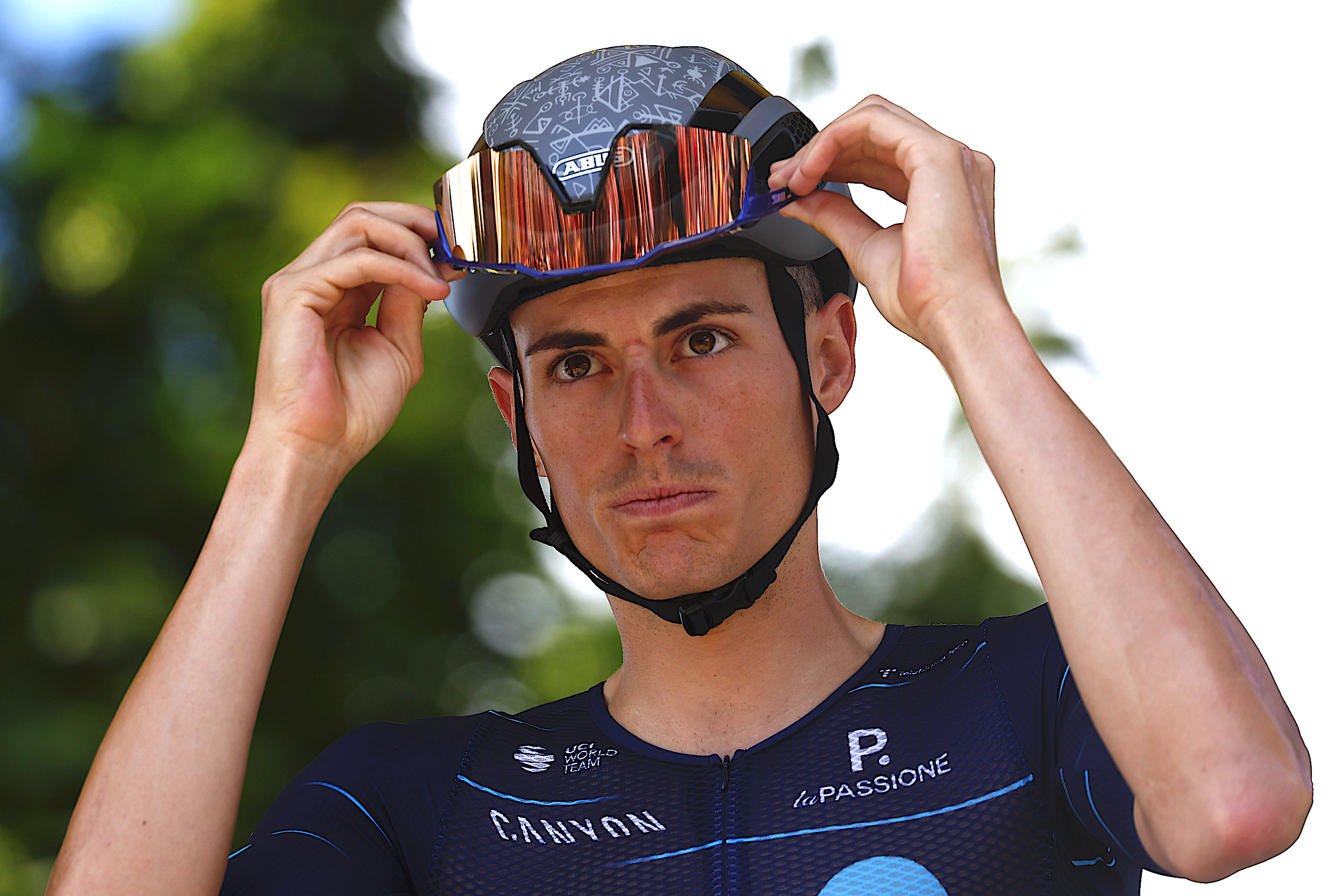
Enric Mas finished the 2022 season as the Vuelta a España runner-up behind Remco Evenepoel and the Lombardia runner-up behind Tadej Pogačar. Looking back on his 2018 breakthrough and his steady - if unspectacular - showings since, it felt like a coming-of-age, a sign that he could be on the cusp of the world's very best in 2023.
But what made this late-season rise so extraordinary are the depths to which he plummeted during the summer.
"It was a disaster," Mas says repeatedly during an off-season interview with Cyclingnews.
"The Tour de France? Best to erase it from my memory because from start to finish it was horrendous."
There was nothing wrong with Mas' form at the Tour, at least not physically. Uphill, he was was fine. The problem was going down.
'It felt like Ineos saw some stats rather than me as a person' - Geraint Thomas interview
I race on instinct and I'm not going to change – Tadej Pogacar interview
'I kept on racing because of the ban' – Davide Rebellin's three decades in pro cycling
Jonas Vingegaard: Defending the Tour de France is hard but I’m up for the challenge
Detailing his woes, what emerges is a classic case of the 'yips' - that infamous sporting affliction that leave athletes incapable of performing even their most basic of routines. Like a golfer's hand suddenly wobbling when putting away a simple four-footer, so Mas began to lock up almost every time the road went downhill.
At times, he felt like he was "riding a bike for the very first time". He lost all confidence in himself, and when that happens, "you lose everything".
Get The Leadout Newsletter
The latest race content, interviews, features, reviews and expert buying guides, direct to your inbox!
The descending yips took root during a series of crashes in the first half of the season, with the Movistar rider identifying three key triggers: one at Tirreno-Adriatico in March, another at Itzulia Basque Country the next month, and then again at the Critérium du Dauphiné in the build-up to the Tour. Although none left him with serious injuries, collectively they left a mental scar.
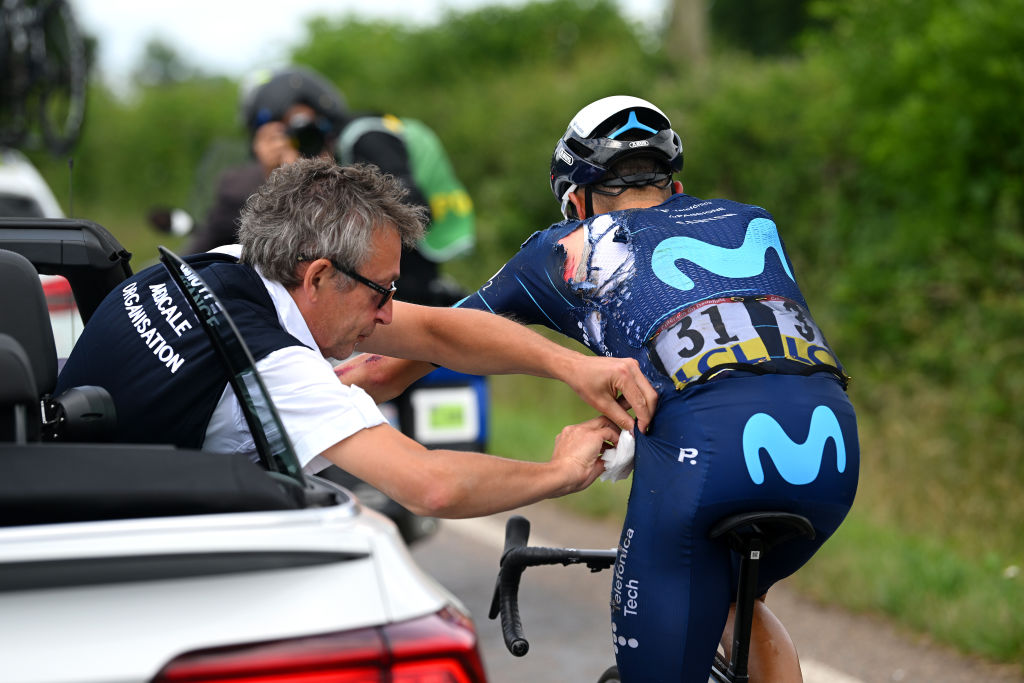
At the Tour, Mas was a shadow of himself. He nursed his bike gingerly through the slippery opening time trial in Copenhagen and although he fared surprisingly well on the cobbled stage, he was very much exposed in the high mountains.
I started to panic. I could barely control my bike anymore
He struggled through the Alps in 9th place and things deteriorated further in the Pyrenees, where he went into crisis on the descent into Foix and again off the Aubisque and Spandelles on the stage to Hautacam.
"I started to panic. I was afraid of every bend," Mas explains.
"Doubts creep into your head and then take over. Your head tells you you need to brake going into corners that you can just go through at 80km/h. It's hard to explain but when your head tells you you have to do something, you do it.
"The time I was losing became secondary to me. The important thing was my safety, because there were times when I could barely control my bike anymore."
The day after Hautacam, two days from Paris, Mas left the Tour - not due to crashes but COVID-19. In reality, though, his Tour was already over.
"By that point, the Tour was almost irrelevant to me. I wanted to finish and I was annoyed not to, but I was already thinking about the Vuelta."
A psychologist and a descending coach
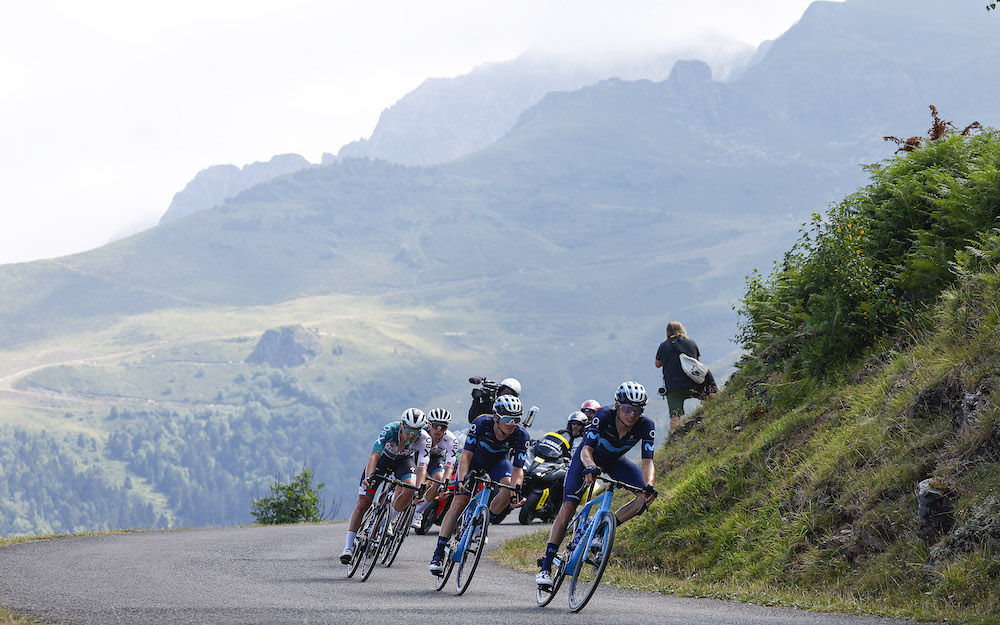
Discussing the Vuelta, Mas coyly says he made "a small change" and was "able to overcome it". There was, however, rather more to it than that.
After discussions with his managers at Movistar, Mas began working with two specialists: a psychologist and a descending expert.
"After the Tour, I switched off for a few days, then I got to work," he says. "There was one month between the Tour and Vuelta and it was a month of hard work. The psychologist and the descending expert, and my coach all worked hand in hand and helped me a lot."
The main task was to head out into the backyard of his adopted home of Andorra, pick a climb, go up, go down, rinse, repeat.
"Andorra is full of mountains and every time you go up, you have to go down. It was about repeating the descents, then stopping and looking at how you rode them, what you did well and what you did badly. Then go back up and do it again," Mas says.
"When you lose confidence in yourself, you have to get it back, and a big part of that is technique - how to address the corners, how to distribute your weight. Bit by bit, we turned it around."
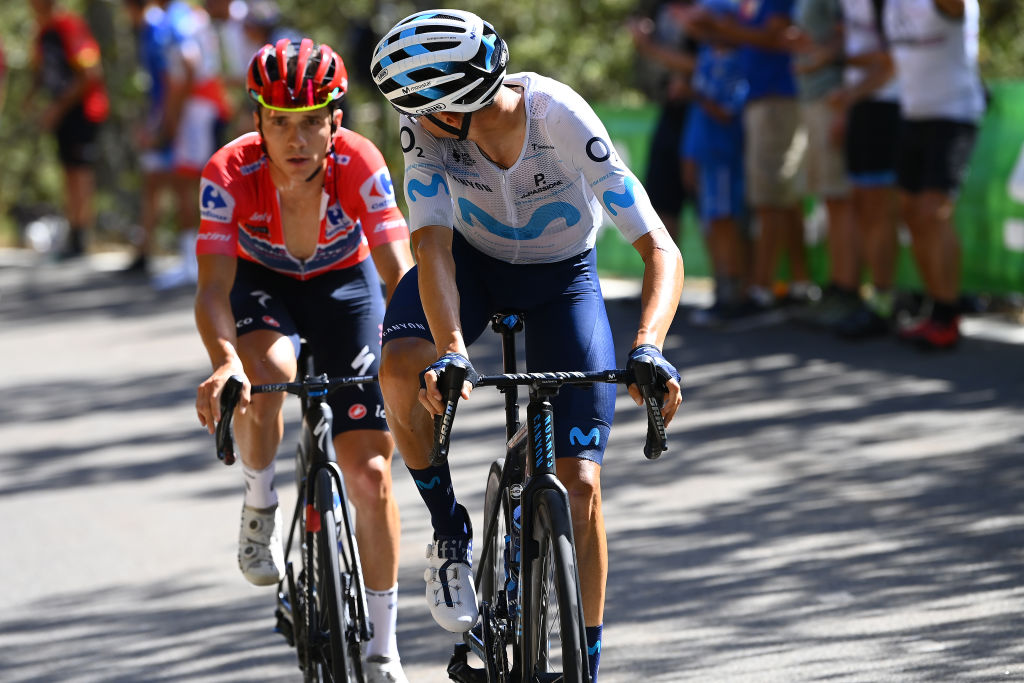
The psychologist also had a part to play in rationalising the descending process, but things went deeper on that front.
He needed to take a step back. When he really relaxed, things started to turn around
José Joaquín Rojas
Mas says the sessions lasted one hour and covered "all the themes", with a focus on "enjoying things again". It's something he's less expansive on, and understandably so, but it's a point that's picked up by his teammate, the Movistar stalwart José Joaquín Rojas.
"All the team worked with him, above all to support him psychologically, because I think that's what he needed most," Rojas tells Cyclingnews.
"The form was very good but he needed to take a step back. With my 37 years of age, I tried to transmit some veteran's calm to him, above all encouraging him to take enjoyment in being on the bike. He's in love with the sport, like we all are, but maybe needed to lose the 100% pro cyclist focus for a while and enjoy riding, time with family, with friends.
"I think that when he really relaxed, that was when things started to turn around. He went to the Vuelta without pressure and there he was the Enric we all know and love - at his level, smiling, riding well."
Re-born
Mas was indeed a man re-born at the Vuelta, the only one to get anywhere close to a rampant Remco Evenepoel. And it was close, but for the mid-race time trial, which accounted for 1:51 of Evenepoel's final winning margin of 2:02.
"We knew that I had ended the Tour in good shape, in inverted commas. I didn't know how COVID would hit me but fortunately I recovered well and found some of the best form of my life," Mas says.
Bit by bit I'm getting closer to the world's best
As for the descents: "They weren't a problem. There was one pretty sketchy one in Asturias but that was just plain dangerous and everyone was nursing it down. I wasn't having the problems I did in the Tour."
Mas took to the second step of the podium in Madrid, as he had done 12 months previously and as he had done in 2018 in his second pro season. From there, he went to the Italian end-of-season Classics and continued to shine.
He placed 9th at Coppa Agostoni and then claimed the first win of his season at the Giro dell'Emilia, dispatching none other than Pogačar on the steep haul up the San Luca climb. At Il Lombardia he floated to the top with the two-time Tour champion once again but lost out in the sprint, although not by much.
Second to Evenepoel and second to Pogacar in major races, and close seconds at that, it must have felt like a big step.
"That gives me confidence for sure. I'm on the right path. Bit by bit I'm getting closer to them and one day I hope to be on their level."
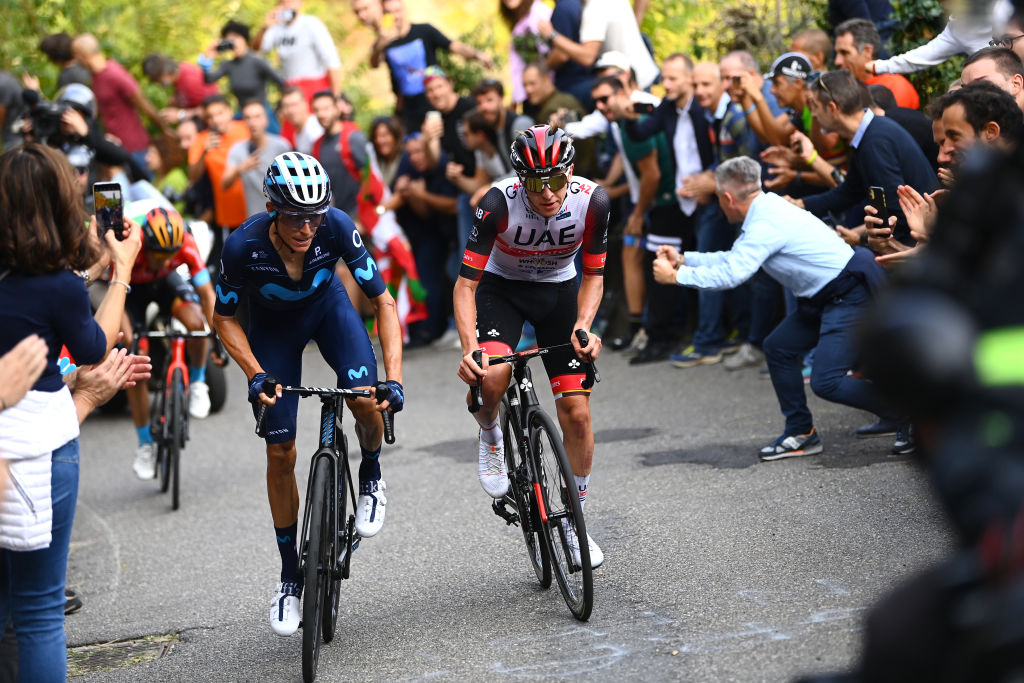
Mas has arguably struggled to live up to the expectations set by his breakthrough runner-up finish at the 2018. After a difficult 2019 he moved to Movistar with three sets of shoes to fill - Richard Carapaz, Nairo Quintana, and Mikel Landa all departed that winter - and took time to find his feet.
"The results weren't there," he says, despite placing 5th in both the Tour and Vuelta in 2020, then 6th and 2nd respectively in 2021. "They're consistent results, good results, but they're not 'top'."
Being signed as a home hope for a Spanish team, replacing three seasoned Grand Tour campaigners, there was no shortage of pressure on his shoulders at a young age. His ability to handle it all was even questioned publicly by his own boss this summer.
He'll start next year with the mentality that he can do incredible things
Rojas
"I've no idea, that's the first I've heard of it," he says in response to Eusebio Unzué's comments that lacked the capacity to lead the team. "I don't feel too much pressure," he adds, even if long-standing talisman Alejandro Valverde is finally retiring.
"Enric seemed a little serious at first, but I've roomed with him this year and he's a really extroverted character who makes jokes. He's very direct when he wants something and is someone who says things to your face," Rojas says of Mas' leadership qualities.
"With the results he had at the end of the year, he'll start next year with another mentality - the mentality that he can do incredible things."
Mas has yet to define his season structure in 2023 but it will likely follow a familiar pattern to the past two years. Although he doesn't rule out the Giro d'Italia, he describes the Tour de France route, which not only starts in Spain but is also about as light as possible on time trialling, as "very attractive". Another Tour-Vuelta combination seems likely, while his Lombardia result will raise hopes in the hilly Classics.
Having got so close to the best in the world, how can he make that next step up?
"By working hard, and enjoying working hard," Mas says. "Every year I've grown a little more and I think I've got room for improvement.
"This year I felt my form was better than ever - not just when the results came, but the whole year. The numbers back that up, too.
"With some more improvement, some more confidence, and a bit more experience, I think I can get there."
Patrick is a freelance sports writer and editor. He’s an NCTJ-accredited journalist with a bachelor’s degree in modern languages (French and Spanish). Patrick worked full-time at Cyclingnews for eight years between 2015 and 2023, latterly as Deputy Editor.
